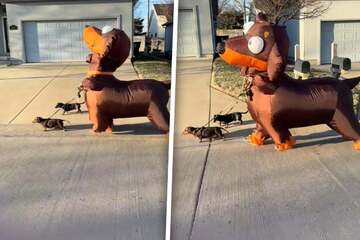Can dogs lie and trick humans on purpose?
The living room is a mess, the cushions are torn to shreds, and Fido is sitting there with an innocent but perhaps suspicious look. Is your dog pulling one over on you? And can dogs purposely lie to us? This dog guide puts the topic to the test, and the results are surprising.
Can dogs deliberately deceive us?

Sometimes, our four-legged friends can be certified tricksters. And if you've found yourself asking, "Is my dog deceiving me?" you're not alone!
Researchers have actually thoroughly looked into the question with a study, which was able to confirm that dogs can consciously change their behavior in order to deceive us.
The results are even more surprising because lying requires a certain intelligence level and certain cognitive abilities. Until the study, lying had only been proven in humans and apes.
But there are also other animal species, such as swallows, that have been shown to deceive their fellow species for their own good.
Until a few years ago, however, the necessary research was lacking to also be able to add dogs to the list of those animals that are capable of "lying."
A scientist from the University of Zurich shed light on the subject with her doggy experiments. The results of the study were published in 2017 in Animal Cognition journal, and found the following:
- Dogs are capable of lying for strategic reasons
- Dogs do not lie to feign emotion to humans or other dogs
- Dogs are not always aware of their lies

Do dogs know they're lying?

Dogs do not know that they are deceiving other dogs or humans because they have no moral compass, which means they are only making decisions based on their success.
This can consist of getting a treat, getting a coveted place on the couch, or secretly emptying the food bowl of a fellow dog.
A dog cannot judge their behavior as either good or bad.
In this way, they strongly resemble toddlers. Toddlers, too, are not aware of the effects of their lies on others. Their only concern is to gain an advantage for themselves, or to not be punished for a certain behavior. This is the only reason they will try to hide their actions – for the reward, not from knowning what is right or wrong.
Lead author of the study Marianne Heberlein said in an interview with Broadly (now VICE), "A dog is and always will be a loyal, lovable companion.
"But the study also shows that dogs, just like other animals, try to increase their own advantage. They seem to know what they want and can manipulate people to achieve their goal."
Do dogs lie like humans?

This much is certain: dogs are capable of deliberately deceiving their fellow species, and also humans, if they expect to gain an advantage from it.
After all, experience shows that good deceptive maneuvers in the animal world can make a pet's life easier, or even save it.
However, the action cannot simply be equated with human "lying."
Whereas humans lie primarily verbally, i.e. deliberately dishing up untruths to their counterparts, dogs deceive with their facial expressions, gestures, and body language. The exchange happens non-verbally and without any ulterior motives.
Rather, the instinct for self-preservation plays a major role for pups.

If your dog sits happily nearby wagging his tail and begging for food, you may be the victim of some puppy manipulatation - but at least Fido doesn't mean any harm.
Cover photo: 123RF/iakovenko

